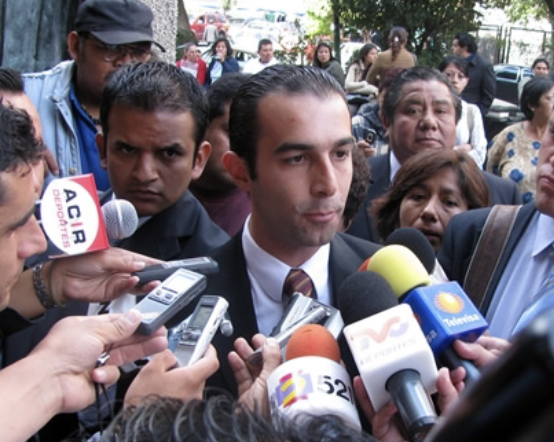Introduction: A Profession Under Constant Threat

The brutal murder of attorney David Cohen, which occurred last night, has shaken Mexico’s legal community. This tragic event underscores that practicing law in Mexico can be a life-threatening profession. It also demonstrates how threats to justice extend beyond courtrooms, endangering those who defend the law itself.
The recent murder of lawyers like David Cohen is not an isolated case — it is part of an alarming and persistent trend that undermines the rule of law and exposes the deep vulnerabilities of Mexico’s justice system.
Who Was David Cohen: A Committed Lawyer

His Professional Background
David Cohen, a graduate of the National Autonomous University of Mexico (UNAM), was a criminal lawyer with over 15 years of experience. He earned a solid reputation for defending civil rights and confronting corruption and organized crime. Known for his ethics and fearlessness, Cohen became a respected figure among both colleagues and clients who admired his unwavering pursuit of justice.
His Last Cases and Civic Commitment
At the time of his death, Cohen was handling several highly sensitive cases within the scope of criminal law in Mexico, including investigations into drug trafficking and government corruption.His refusal to accept intimidation, combined with his commitment to exposing wrongdoing, made him both a respected legal advocate and a target for those threatened by his integrity.
Attorneys who dedicate their careers to defending human rights in Mexico frequently become targets of harassment, violence, or worse. Their work puts them on the frontlines of a dangerous fight for justice and transparency.
A Brief History of Violence Against Lawyers in Mexico
How the Problem Has Evolved
Violence against legal professionals in Mexico has increased dramatically over the past two decades.In the early 2000s, as organized crime expanded, reports of lawyers being threatened, kidnapped, or killed began to multiply—especially in states such as Michoacán, Sinaloa, Chihuahua, and Guerrero.
Before 2006, murders of lawyers were rare. But after the government launched its “war on drugs,” the number of targeted killings skyrocketed, exposing the lack of a coherent protection of lawyers policy.
Alarming Statistics

- In 2023, official records show 47 murders of lawyers across the country.
- Over the past five years, more than 240 legal professionals have been killed.
- 70% of the victims practiced criminal law or human rights law.
- The most dangerous states to practice law are Guerrero, Oaxaca, Michoacán, Chihuahua, and Veracruz.
- Mexico currently ranks as the most dangerous country in Latin America for lawyers, with 95% of cases remaining unsolved.
These numbers reveal not only a public safety crisis but also a weakening of Mexico’s legal institutions and access to justice.
The Most Dangerous Fields of Legal Practice
Criminal Law: The Deadliest Specialization
Lawyers who practice criminal law in Mexico face the highest risks. Many represent clients in organized crime cases, drug-related offenses, and high-level corruption. Defending the accused — or victims — in cases involving cartel-linked crimes can make attorneys direct targets of intimidation or violence.
Corporate Law in Sensitive Contexts
Corporate lawyers involved in high-stakes litigation—especially those exposing money laundering or corruption—are also at risk. Litigating against companies with political or criminal connections often means treading on dangerous ground.
Human Rights and Social Justice Law
Those defending human rights in Mexico face a double threat: from criminal groups and, in some cases, from corrupt officials. Lawyers working on cases of femicide, enforced disappearances, or land disputes involving indigenous communities often receive death threats for doing their job.
Landmark Cases that Shaped Public Opinion
- Jorge Antonio García (2019, Oaxaca): A human rights lawyer representing families of the disappeared, murdered after multiple threats.
- Miroslava Breach (2017, Chihuahua): A journalist and lawyer investigating corruption and cartel ties within politics, assassinated for exposing the truth.
- The Ayotzinapa Legal Team: Attorneys representing the families of the 43 missing students have endured threats, harassment, and attempted kidnappings for years.
These cases expose a grim reality: the prevailing impunity and justice imbalance in Mexico continues to embolden aggressors and silence defenders of law.
Testimonies from Lawyers Living Under Threat
María Elena Rodríguez, Lawyer, Guerrero:
"After I won a family law case involving a corrupt municipal official linked to a cartel, the phone calls started—threats at 3 a.m., and messages describing my children’s school route. I’ve moved three times in six months. My family lives in another state. Justice, sadly, now requires sacrifice.">>
Roberto Sánchez, Criminal Lawyer, Michoacán:
"I’ve practiced law for over 20 years, but the last few have been terrifying. Every day I assess not only my client’s risk but my own. Colleagues have been killed, and many have left the profession altogether. Practicing law in Mexico has become an act of bravery.">>
These firsthand accounts illustrate the emotional and psychological trauma of living under constant fear — not just for one’s life but for one’s family.
The Mexican State’s Responsibility
Legal Basis and Obligations
The Mexican Constitution, in Article 17, guarantees the right of access to justice — a principle that implicitly demands protection for those who ensure justice is served.
Similarly, Article 5 recognizes freedom of profession, obliging the State to provide safe conditions for the practice of law.
Structural Failures
Despite the General Law for the Protection of Human Rights Defenders and Journalists (2012), protection remains inconsistent and inefficient.Government data reveals:
- Only 23% of lawyers under threat included in the official protection mechanism have received effective measures.
- The average response time is 45 business days—far too long when death threats are imminent.
- 78% of implemented protections are rated as inadequate by recipients.
- 54% of protected lawyers report recurring threats even under government surveillance.
The Problem of Impunity
The fight against impunity and justice deficits is central to creating real change.Common obstacles include:
- Poorly investigated cases and undertrained prosecutors.
- Lack of specialized protocols or investigative divisions.
- Official corruption and leaked information to criminal groups.
- Absence of reliable witness protection programs.
International Protection Measures
Global Concern and Response
The international community has taken notice of Mexico’s crisis:
- The Inter-American Commission on Human Rights (IACHR) has issued over 30 precautionary measures to protect Mexican lawyers.
- The UN Office of the High Commissioner for Human Rights has expressed “deep concern” and called for immediate government intervention.
- The UN Special Rapporteur on the Independence of Judges and Lawyers has listed Mexico as a high-priority country for monitoring.
Specific Recommendations
International bodies recommend:
- Creating a national registry of threats against lawyers.
- Establishing specialized prosecutors’ offices for crimes targeting legal professionals.
- Implementing temporary relocation programs to protect lawyers and their families.
- Enforcing digital security and investigation protocols specific to legal practitioners.
- Guaranteeing permanent protection funding within the federal budget.
The Impact on Mexico’s Justice System
A Climate of Fear and Silence
The murder of lawyers like David Cohen has generated a paralyzing atmosphere of fear. Many capable professionals now refuse to take on complex or high-risk cases, leaving major crimes unpunished.
Direct Consequences for Access to Justice
When attorneys are targeted, citizens suffer the consequences:
- Fewer lawyers willing to defend sensitive cases.
- Victims of violent crimes left without representation.
- Strengthening of criminal and corrupt networks.
- Growing public distrust in judicial institutions.
Protecting lawyers means protecting democracy’s last line of defense: the right to an impartial trial.
Choosing a Lawyer Safely in Mexico
To ensure safety and quality representation:
- Verify the lawyer’s active license and bar registration.
- Confirm their specialization and track record in relevant cases.
- Review their reputation through verified directories like Abogadomex.
- Ensure their office has robust confidentiality and security measures.
- Discuss openly any potential risks depending on the nature of the case.
Legal directories like Abogadomex are fundamental tools that connect citizens with certified, reliable, and vetted professionals — safely and transparently.
Legal Framework and International References
National Legal Framework
- Mexican Federal Penal Code (Articles 284–285): criminalizes threats against public officials but omits explicit protections for attorneys — a legislative reform is urgently needed.
- General Law for Human Rights Defenders and Journalists (2012): provides a framework for protection but is inadequately applied to lawyers.
International Standards
- UN Basic Principles on the Role of Lawyers (1990): states must ensure lawyers can perform all professional functions free from intimidation or interference.
- American Convention on Human Rights (Article 8): recognizes the right to defense, obliging states to protect those who provide this essential service.
- ILO Convention 169: protects those who defend indigenous and minority rights, often in high-risk legal contexts.
Preventive Measures for Lawyers
To enhance their safety, lawyers should:
- Constantly vary routes and routines.
- Encrypt sensitive files and restrict access.
- Install surveillance systems in offices.
- Establish emergency communication codes with colleagues.
- Report all threats to the official protection mechanism.
Collective organization — through law societies, bar associations, and civil networks — remains essential to effective protection of lawyers.
Conclusion: Honoring Memory Through Action
The murder of David Cohen is not only a personal tragedy but a symbol of a national crisis in the legal profession. It highlights the urgent need to protect those who protect others.
Fighting threats to justice and ending impunity and injustice are fundamental for Mexico’s future. Protecting lawyers is not an act of privilege — it is a democratic necessity.
Honoring David Cohen’s memory means ensuring that no more lawyers die for upholding the law.
